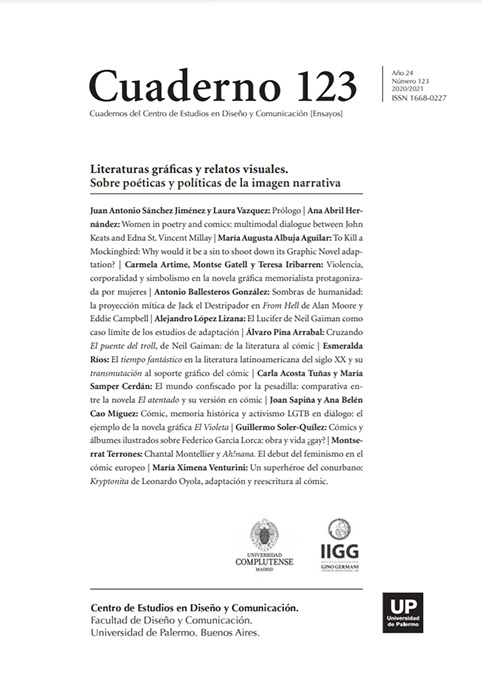El Lucifer de Neil Gaiman como caso límite de los estudios de adaptación
Abstract
The aim of this paper is to examine the intertextual processes affecting Lucifer Morningstar and their convoluted continuity from The Sandman comic books (1989-96) to the spin-off Lucifer (1999) and the homonymous TV show (2016-ongoing). It is noteworthy that the various literary sources employed by Neil Gaiman to create his Lucifer (from classic literature and biblical tradition to DC’s superhéroes) did not exercise the same level of influence during The Sandman’s complete run. Instead, the centrality of each of them fluctuated over the years. As a result, all three of Lucifer’s appearances can be regarded as semi-independent versions of the character, the third one serving as the base for later adaptations. Regarding the TV show, this translated in a delicate intertextual balance between the original comic book and its common literary sources: by targeting both the comic book reader and a non-specialized audience familiar only with the judeochristian myth of the Devil, it was mandatory to maintain multiple “loyalties” that are impossible to conceptualize using conventional reception chains. This makes Lucifer a paradigmatic case of analysis for Adaptation Studies in the sense that it highlights some of its most extreme scenarios.
References
Alighieri, D. (2019). Divina Comedia. Ed. G. Petrocchi, trad. L. Martínez de Merlo. Madrid: Cátedra.
All Time Worldwide Box Office Grosses (marzo de 2020). Box Office Mojo. Recuperado de www.boxofficemojo.com/chart/top_lifetime_gross/?area=XWW . Consultado el 12 de marzo de 2020. La Biblia (2010). Trad. La Palabra, ed. Sociedad Bíblica de España. Recuperado de www.biblegateway.com . Consultado el 15 de marzo de 2020.
Canal, H. (26 de enero de 2016). Bowie-Lucifer. The Gaiman Connection. Tomos y Grapas. Recuperado de www.tomosygrapas.com/articulo-bowie-lucifer-the-gaiman-connection/ . Consultado el 12 de marzo de 2020.
Carey, M. (2006). Lucifer: Morningstar. Nueva York: DC Comics.
__________. (2007). Lucifer: Evensong. Nueva York: DC Comics.
Crisis on Infinite Earths: Part Three (10 de diciembre de 2019). The Flash, dirigido por
D. McWhirter, actuación de T. Ellis, temporada 6, episodio 9. The CW, Warner Bros. Television et al.
Davidson, G. (1967). Samael. A Dictionary of Angels, including the fallen angels. Nueva York: The Free Press, p. 255.
Delano, J. (1988). John Constantine, Hellblazer nº12. Nueva York: DC Comics.
Eco, U. (2004). The Myth of Superman. En J. Heer y K. Worcester (Eds.), Arguing Comics: Literary Masters on a Popular Medium. Jackson: University Press of Mississippi, pp. 146-63.
Elleström, L. (2010). The Modalities of Media: A Model for Understanding Intermedial Relations. En L. Elleström (Ed.), Media Borders, Multimodality and Intermediality. Basingstoke: Palgrave Macmillan, pp. 11-48.
__________. (2017). Adaptation and Intermediality. En T. Leitch (Ed.), The Oxford Handbook of Adaptation Studies. Nueva York: Oxford University Press, pp. 509-526.
Gaiman, N. (2010a). The Sandman: Season of Mists. Nueva York: DC Comics.
__________. (2010b). The Sandman: The Kindly Ones. Nueva York: DC Comics.
__________. (2018). Sandman nº 1: Preludios y nocturnos. Trad. Fernando Refoyo Romero. Barcelona: ECC Ediciones.
Greenberger, R. (2008). The Demon. En A. Dougall (Ed.), The DC Comics Encyclopedia. Londres: Dorling Kindersley, p. 99.
Groensteen, T. (2007). The System of Comics. Trad. B. Beaty y N. Nguyen. Jackson: University Press of Mississippi.
Hutcheon, L. (2006). A Theory of Adaptation. Abingdon: Routledge.
Jahlmar, J. (2015). ‘Give the devil his due’: Freedom, Damnation, and Milton’s Paradise Lost in Neil Gaiman’s The Sandman: Season of Mists. Partial Answers 13 (2), pp. 267-286.
Jiménez, J. (19 de mayo de 2014 ). Mike Carey: ‘Mi Lucifer es más intelectual y engolado que el de Neil Gaiman’. RTVE. Recuperado de www.rtve.es/noticias/20140519/mikecarey-lucifer-mas-intelectual-engolado-neil-gaiman/939697.shtml . Consultado el 12 de marzo de 2020.
Jung, L. (julio de 1925). Fallen Angels in Jewish, Christian and Mohammedan Literature. A Study in Comparative Folk-Lore. The Jewish Quarterly Review 16 (1), pp. 45-88.
Kapinos, T. (creador) (2015). Lucifer. Jerry Bruckheimer Television, Warner Bros. Television et al.
Kastor, F. S. (2005). The Satanic Pattern. En H. Bloom (Ed.), Bloom’s Major Literary Characters: Satan. Philadelphia: Chelsea House, pp. 55-70.
King, P. (2012). Augustine and Anselm on Angelic Sin. En T. Hoffmann (Ed.), A Companion to Angels in Medieval Philosophy. Leiden: Brill, pp. 261-281.
Link, L. (1995). Devil: A Mask Without a Face. Londres: Reaktion Books.
McCabe, J. (ed.) (2004). Hanging Out With the Dream King: Conversations with Neil Gaiman and his collaborators. Seattle: Fantagraphics Books.
Mitaine, B., Roche, D. y Schmitt-Pitiot, I. (2018). Introduction: Adapting Adaptation Studies to Comic Studies. En B. Mitaine, D. Roche e I. Schmitt-Pitiot (Eds.), Comics and Adaptation. Trad. A. Rommens y D. Roche. Edición de Kindle. University Press of Mississippi.
Moore, A. (1985). Swamp Thing Annual nº2. Nueva York: DC Comics.
Olson, S. P. (2005). Neil Gaiman. Nueva York: The Rosen Publishing Group.
Pérez Bowie, J. A. (2009). Sobre reescritura y nociones conexas: un estado de la cuestión. En J. A. Pérez Bowie (Ed.), Reescrituras fílmicas: nuevos territorios de la adaptación. Salamanca: Ediciones Universidad de Salamanca, pp. 21-44.
Pratt, H. J. (2017). Comics and Adaptation. En F. Bramlett, R. T. Cook y A. Meskin (Eds.), The Routledge Companion to Comics. Nueva York: Routledge, pp. 230-38.
Round, J. (2010). ‘Is this a Book?’ DC Vertigo and the Redefinition of comics in the 1990s. En P. Williams y J. Lyons (Eds.), Rise of the American Comics Artist: Creators and Contexts. Jackson: University Press of Mississippi, pp. 14-30.
Russell, J. B. (2005). Lucifer in High Medieval Art and Literature. En H. Bloom (Ed.), Bloom’s Major Literary Characters: Satan. Philadelphia: Chelsea House, pp. 125-54.
Sanders, J.(2006). Adaptation and Appropriation. Nueva York: Routledge.
Tyrrell, T. (Summer 2016). ‘I didn‘t say it. Milton said it. And he was blind’: Alan Moore, Neil Gaiman and Paradise Lost. The Luminary 7, pp. 26-39.
Los autores/as que publiquen en esta revista ceden los derechos de autor y de publicación a "Cuadernos del Centro de Estudios de Diseño y Comunicación", Aceptando el registro de su trabajo bajo una licencia de atribución de Creative Commons, que permite a terceros utilizar lo publicado siempre que de el crédito pertinente a los autores y a esta revista.


